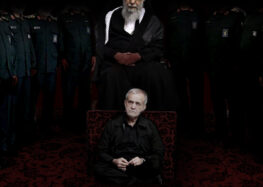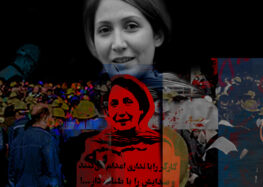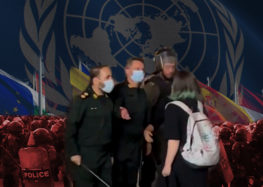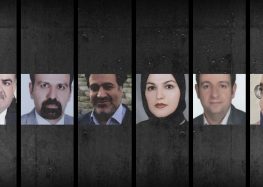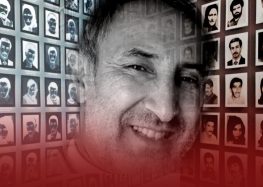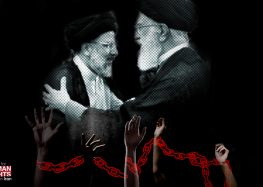Hardliners in Iran Moving to Shut Pro-Rouhani Forces Out of Upcoming Parliamentary Elections
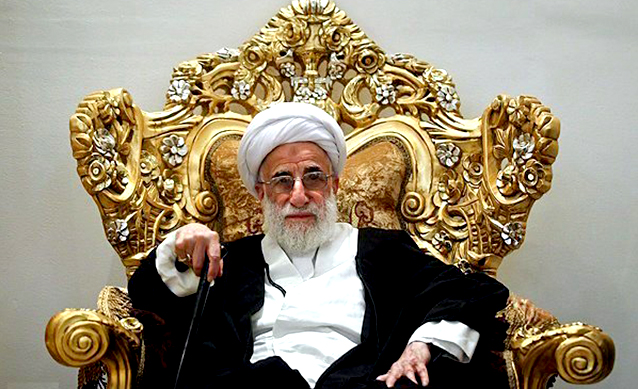
Ahmad Jannati, head of Iran’s powerful Guardian Council, in charge of disqualifying thousands of applicants in the upcoming parliamentary elections.
One percent of Reformist Applicants Approved as Candidates by Guardian Council
January 20, 2016—Hopes that pro-Rouhani and reformist candidates would be able to participate in Iran’s upcoming Parliamentary elections are dwindling fast, as the country’s supreme leader, Ayatollah Khamenei, proclaimed vocal support today, January 20, 2016, for a vetting process that has seen all but one percent of the reformist applicants disqualified.
Clarifying an earlier statement in which Khamenei said, “Even those who have problems with the regime must participate in the elections,” Iran’s supreme leader said today, January 20, 2016, that “What I said does not mean that those who don’t believe in the regime should be sent to the Parliament.”
“Hardliners in Iran, led by supreme leader Khamenei, are obviously terrified of the political preferences of the Iranian people,” said Hadi Ghaemi, executive director of the International Campaign for Human Rights in Iran.
“Forcing people to choose among a handful of candidates handpicked by the leader does not constitute a democratic election,” Ghaemi added.
The Council of Guardians, the body in Iran charged with vetting candidates to Parliament, disqualified nearly 6,000 applicants last week, 3000 of which were reformist applicants, leaving only 30 reformist candidates to run. This is the lowest rate of approved applicants for any Parliament in the history of the Islamic Republic.
While President Rouhani promised to use all his constitutional powers to prevent the mass exclusion of candidates, and the disqualifications can be reviewed up until February 15, the high number of applicants disqualified by Iran’s powerful Guardian Council suggests that prospects for a change in the current hardliner majority Parliament are slim.
Many observers, both in and outside Iran, had expected moderate forces allied with the Rouhani administration to reap significant electoral gains after the administration’s achievement of the landmark nuclear agreement that rolled back many of the crippling international sanctions on Iran. But a crackdown in Iran since then against reformists and independent journalists, the recent disqualifications, and now Khamenei’s statement, seem to indicate hardliners have no intention of ceding any domestic ground to moderate forces.
National elections for Parliament and for the Assembly of Experts, the body that selects the country’s supreme leader, are set for February 26, 2016. According to official Interior Ministry figures, more than 12,000 people signed up to become candidates for Parliament.
The Ministry’s spokesperson, Hosseinali Amiri, said 814 applicants were dropped in an initial review and the rest were passed on to election oversight committees across the country set up by the Council of Guardians. Of the remaining 11,000-plus applicants, only 42 percent were approved by the committees.
The reasons for many of the rejections were not that the candidates lacked qualifications. Rather, Nejatollah Ebrahimian, the spokesperson for the Council of Guardians, admitted that a portion of the applicants were rejected “because it was not possible to check their credentials in a short amount of time.”
“We are very optimistic that the Council of Guardians will look into this matter. If a qualified person has been disqualified, which seems to have been the case in numerous instances in my view, then the Council of Guardians should reconsider. As President I will use all my authority in this regard,” Rouhani told a press conference on January 17, 2016.
Iranian leaders often crow over the country’s regular elections. But a candidate vetting process controlled by a body comprised of officials who owe their spot either directly or indirectly to the supreme leader, and which disqualifies the vast majority of the applicants because they are not considered loyal enough supporters of Khamenei and his hardline allies, is hardly a democracy.
It appears that Islamic Republic of Iran’s founder Ayatollah Rouhollah Khomeini’s oft-quoted slogan during election time, “The people’s vote is the determining factor,” has degraded into the Council of Guardians being the determining factor. The vetting process blatantly bars political hopefuls from exercising their right to stand in elections, and denies people the opportunity to vote for candidates from a diverse pool.
Etemad newspaper reported on January 19, 2016, that Rouhani had gained access to the list of rejected applicants and was planning to meet Khamenei to seek his support in making the elections more inclusive. However, such mass disqualifications could not have been possible without Khamenei’s tacit approval.
“They are robbing people of their right to choose and meddling in the outcome and composition of the next Parliament,” said socially conservative but politically eclectic MP Ali Motahhari, who has supported the centrist Rouhani administration and has thus been banned from running for re-election along with a number of other “troublesome” MPs.
The list of disqualified candidates so far has not been made public. But reports indicate they include not only opponents and critics of the Islamic Republic but also many reformist loyalists and supporters of Rouhani’s government.
“Some 3,000 reformists had signed up for the elections across the country and only 30, or one percent, were approved,” said Hossein Mara’shi, a member of the Reformist Policy Council.
The President’s legal adviser Elham Aminzadeh confirmed that Rouhani will hold talks with the Council of Guardians “to make sure no one has been disenfranchised by mistake.” In addition, the state news agency IRNA reported that Parliament Speaker will also meet with the Guardians to reach a compromise.
An influential senior cleric close to Khamenei strongly criticized the vetting process. Ayatollah Ghorbanali Dorri-Najafabadi, who is a former intelligence minister and the Friday Prayer leader of Arak, was particularly disturbed by the high number of applicants who were rejected because their qualification was “not proven.”
“What does that mean ‘not proven’? They didn’t reject just one or two people but rather 40 percent of the applicants!” the cleric said. “Take another look at these cases and approve them. It will remove the psychological pressure on the people…and more importantly, it will reduce international pressure on our country by not giving them any excuses to take sides against us.”

